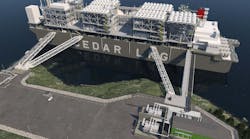By the OGJ Online Staff
JAKARTA, Jan. 16 -- Indonesian national gas company PT Perusahaan Gas Negara (PGN) will need to raise $2.95 billion for four pipeline projects to be completed by 2007, said Pres. W.M.P. Simandjuntak, quoted by the Organization of Petroleum Exporting Countries' news agency.
The company is seeking partners, especially foreign firms with gas trading interests, to take equity positions in the pipelines and provide development funds.
Under a new oil and gas law, PGN must develop pipelines for gas transmission and distribution in Indonesia and the Southeast Asian region, as part of a regional gas pipeline grid.
One of the projects, work on which would begin in the first quarter, would ship gas to Singapore, while the other three would involve building an Indonesian distribution network.
The Singapore pipeline, which would take gas from fields in southern Sumatra from mid-2003, has commitments for $450 million in loans from international lending agencies, while the partners were expected to provide another $276 million, Simandjuntak said.
PGN will seek loans and partners for the 1,100-km East Kalimantan-East Java pipeline, which would be ready by 2005-07, and the onshore, 680-km pan-Java pipeline. Simandjuntak said PGN would have to raise up to $1.4 billion for the two projects.
PGN plans to raise its gas distribution volume to 1 bcfd by 2004, up from the current 350 MMscfd. It hopes to raise distribution to 2 bcfd by 2005-07, when the four pipelines are completed.
That volume could more than double by 2010 as the government removes fuel subsidies and encourages more natural gas use. Industry sources say Indonesia's gas demand is expected to rise 5-8%/year when the present fuel subsidy is phased out in 2004.
